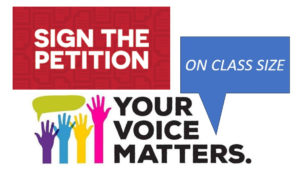Parents and Class Size Matters file Commissioner’s Appeal vs DOE failure to ensure parent consent before placing their children in online classes
Legal documents, including the petition to the State Commissioner, the affidavits, DOE guidance, and the state regulations are posted here. On On June 16, a corrected version of the Appeal was filed, as well as an additional affidavit from Amy Ming Tsai, Bronx parent, so that parents from all five boroughs are represented.
Articles about this legal challenge: Daily News, Parents, advocates ask NY State Dept. of Ed to void remote learning policy as city mulls expansion; Politico Pro, Advocacy group accuses DOE of failing to ensure parental consent for online classes
___
For immediate release: June 14, 2024
Contact: Leonie Haimson, 917-435-9329; leonie@classsizematters.org
Laura Barbieri, (914) 819-3387; LDBarbLaw@gmail.com
Parents and Class Size Matters file Commissioner’s Appeal vs DOE failure to ensure parent consent before placing their children in online classes
On June 12, Class Size Matters and four petitioners filed an appeal to the State Education Commissioner about the New York City Department of Education guidance provided school administrators and staff, dated May 13, 2024. While the guidance ostensibly states that parent consent should be required before placing students into an online class, it also says that schools can assign students to these classes before hearing back from parents and keep them there until and unless parents decline this participation.
These instructions do not constitute parental consent, but parental opt out, a much weaker provision, especially as many parents may not see the opt out forms or understand their rights until it is too late to pull their children out of these classes. Moreover, this guidance conflicts with State Education Regulations approved by the Board of Regents on April 28, 2024 that clearly require parental consent.
“Many parents believe that the online learning adopted by schools during the pandemic did not fully meet their children’s needs, academically, socially, or emotionally. And yet the DOE seems to be in a heedless rush to expand this instructional method as quickly as possible, and has included it as one of the methods that principals can use to implement the class size law. Research shows that the expansion of online learning is likely to undermine many of the benefits that smaller classes would otherwise be able to provide,” said Leonie Haimson, Executive Director of Class Size Matters. “Moreover, many parents may not learn their children are being placed in online classes until it is too late to pull them out, including recent immigrant families, those in temporary housing, parents who work one or two jobs or those without reliable internet at home. These are also the same parents whose children are most likely to struggle with online learning.”
Attorney Laura D. Barbieri who took on this appeal pro bono said, “I am representing these parents and Class Size Matters because of the importance of this issue. It is critical that parents’ rights be upheld to give or withhold their consent prior to their children being put in an online class, as the state regulations require. Parents are likely to know best as to whether virtual learning will damage their children’s opportunity to learn, their social development, and/or their mental health. ” .
Tanesha Grant, another petitioner, is a Manhattan parent and the founder and executive director of Parents Supporting Parents NY and Moms United For Black Lives NYC. Her son, who will be entering the twelfth grade next year at Eagle Academy, was placed in an online class this fall, which she did not discover until November, when she saw his transcript. “He struggled in that class and ended up failing it. I had to go all the way to the Superintendent to get his failing grade off his transcript.”
Tanesha adds: “I am not against online learning, but it is imperative that parents must be made aware that they have the right to consent before their children are assigned to an online class, which never happened in my case. I know from my experience and that of many other parents that in too many schools, communication with parents is horrible. Without this, many parents will never be made know that their children are assigned to an online class until it is too late to do anything about it.”
Another petitioner is Amanda Vender, who is both a parent of two high school students in Queens, and an ESL teacher. She recounts how in the fall of 2022, her son was disadvantaged by being assigned to a 7 AM virtual class at his at school, without her prior knowledge and without his teacher physically present.
Amanda asks, “ What about students who will be assigned to a virtual class from their home? How can the DOE be sure that their parents can properly oversee them and have the proper internet access and equipment without alerting parents in advance? I am a high school teacher who teaches immigrant English Language Learners (ELL) students, many of whom do not have reliable internet at home and need in-person daily instruction to be able to practice speaking English and see their teachers’ full body, gestures, and expressions. They also need multiple opportunities to interact in English with their classmates. None of that will be available through an online class.”
Naila Rosario, a parent of a daughter entering the 12th grade next year in Staten Island said, “My child’s experience of virtual learning during the pandemic was very negative, both academically and emotionally, and I am very opposed to the idea that any New York City student could be assigned to online classes without full parental knowledge and consent. This not only conflicts with the state regulations, but also risks profoundly damaging the quality of education for thousands of New York City students like my daughter, who need and deserve the close feedback and personal connections that only in-person classes can provide.”
Tia Schellstede, a Brooklyn parent whose son will be attending a high school next year, concluded: “It is especially critical that the NYCDOE must notify parents like me and obtain their consent who have children with Individualized Education Programs (IEPs). Students with IEPs have the right to be provided with a free and appropriate education under federal law, and remote instruction is a radical shift in instruction that may not serve their needs. I urge the Commissioner to stand up for parents and ensure that DOE immediately revises their guidance in compliance with the regulations before schools begin expanding online learning, assigning scores of students to these classes, when it will be too late to do anything about it.”
###







